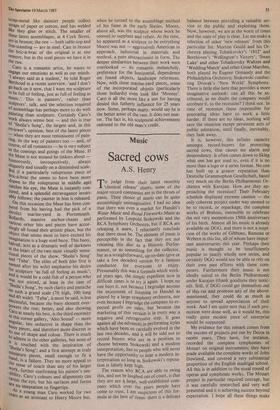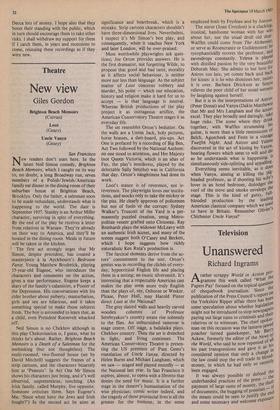Music
Sacred cows
A.S. Henry
To judge from their latest monthly classical release' sheets, some of the major record companies are in the throes of panic. Their choice of music can be quite astonishingly unimaginative. I had no idea that there was even a market for Handel's Water Music and Royal Fireworks Music as performed by Leopold Stokowski and the RCA Symphony Orchestra, but if RCA are releaOng it anew, I reluctantly conclude that there must be. The element of panic is perceptible in the fact that they are not releasing this disc as a Historic Perfor- mance, or as something for the collector, but as a straightforward, up-to-date (give or take a few decades) version by a famous conductor for everyone to enjoy. Presumably this was a formula which work- ed years ago, the simple expedient now in difficult times is to try it again. I hope no one buys it, not because I begrudge anyone the enjoyment of listening to Handel as played by a large symphony orchestra, nor even because I begrudge the company its ex- pected profit on sales, but because the marketing of this version is in every way a negative and retrogressive step. It goes against all the advances in performing styles which have been so carefully evolved in the last two decades, and it will be sold not to record buyers who are in a position to choose between Stokowski and a modern interpretation, but to people who will never have the opportunity to hear a modern in- terpretation so long as Stokowski's reputa- tion is falsely kept high. The reason why RCA are able to swing this, and not be laughed out of court, is that they are are a, large, well-established com- pany which over the years people have come to trust. I am suspicious of this for- mula at the best of times: there is a delicate
balance between providing a valuable ser- vice to the public and exploiting them. Now, however, we are at the worst of times and the state of play is clear. Let me make a selection of other 'new releases' from this particular list: Morton Gould and his Or- chestra playing Tchaikovsky's '1812' and Beethoven's 'Wellington's Victory'; 'Swan Lake' and other Tchaikovsky Waltzes and 'Wedding March' and other Great Marches, both played by Eugene Ormandy and the Philadelphia Orchestra; Stokowski conduc- ting Dvorak's 'New World' Symphony. There is little else here that provides a more imaginative outlook: can all this be at- tributed, as no doubt the company would attribute it, to the recession? I think not. In time of recession those responsible for generating ideas have to work a little harder. If there are no ideas, nothing will save the situation except persistent acts of public adoration, until finally, inevitably, they fade away.
It is, however, this infinite capacity amongst record-buyers for protecting sacred cows, that causes me alarm and despondency. It often comes, down to liking what one has got used to, even if it is no more than a logo or a series format. No one has built up a greater reputation than Deutsche Grammophon Gesellschaft, based very much on the Berlin Philharmonic Or- chestra with Karajan. How are they ap- proaching the recession? Their February schedule displayed extreme caution — the only coherent project under way seemed to be to record, or repackage, the complete works of Brahms, ostensibly to celebrate the not very momentous 150th anniversary of his birth. Almost all his music is already available on DGG, and there is not a suspi- cion of the works of Gibbons, Rameau or Webern in this list, all of whom have impor- tant anniversaries this year. Perhaps their music is thought to be insufficiently popular to justify wholly new series, and certainly DGG would not be able to rely on their own past efforts with these com- posers. Furthermore their music is not ideally suited to the Berlin Philharmonic under Karajan (thank goodness they notic- ed). Still, if DGG could get themselves out of this rut and promote any of the above- mentioned, they could do as much as anyone to spread appreciation of their work. And I am quite sure that if such pro- motion were done well, as it would be, this really quite modest piece of enterprise would be supported.
My evidence for this reinark comes from the success of projects put out by Decca in recent years. They have, for instance, recorded the complete symphonies of Mozart on original instruments; they have made available the complete works of John Dowland, and covered a very substantial proportion of the English madrigal school. All this is in addition to the usual round of operas and symphonic works. The Mozart project in particular required courage, but it was carefully researched and very well presented and it is achieving success beyond expectation. I hope all these things make
Decca lots of money. I hope also that they boost their standing with the public, which in turn should encourage them to take other risks. I shall withdraw my support for them if I catch them, in years and recessions to come, reissuing these recordings as if they were new.











































 Previous page
Previous page